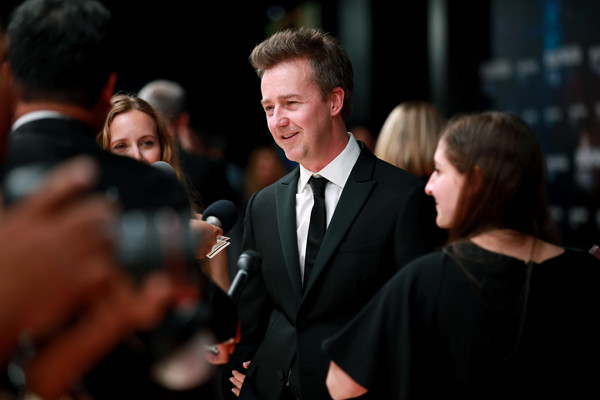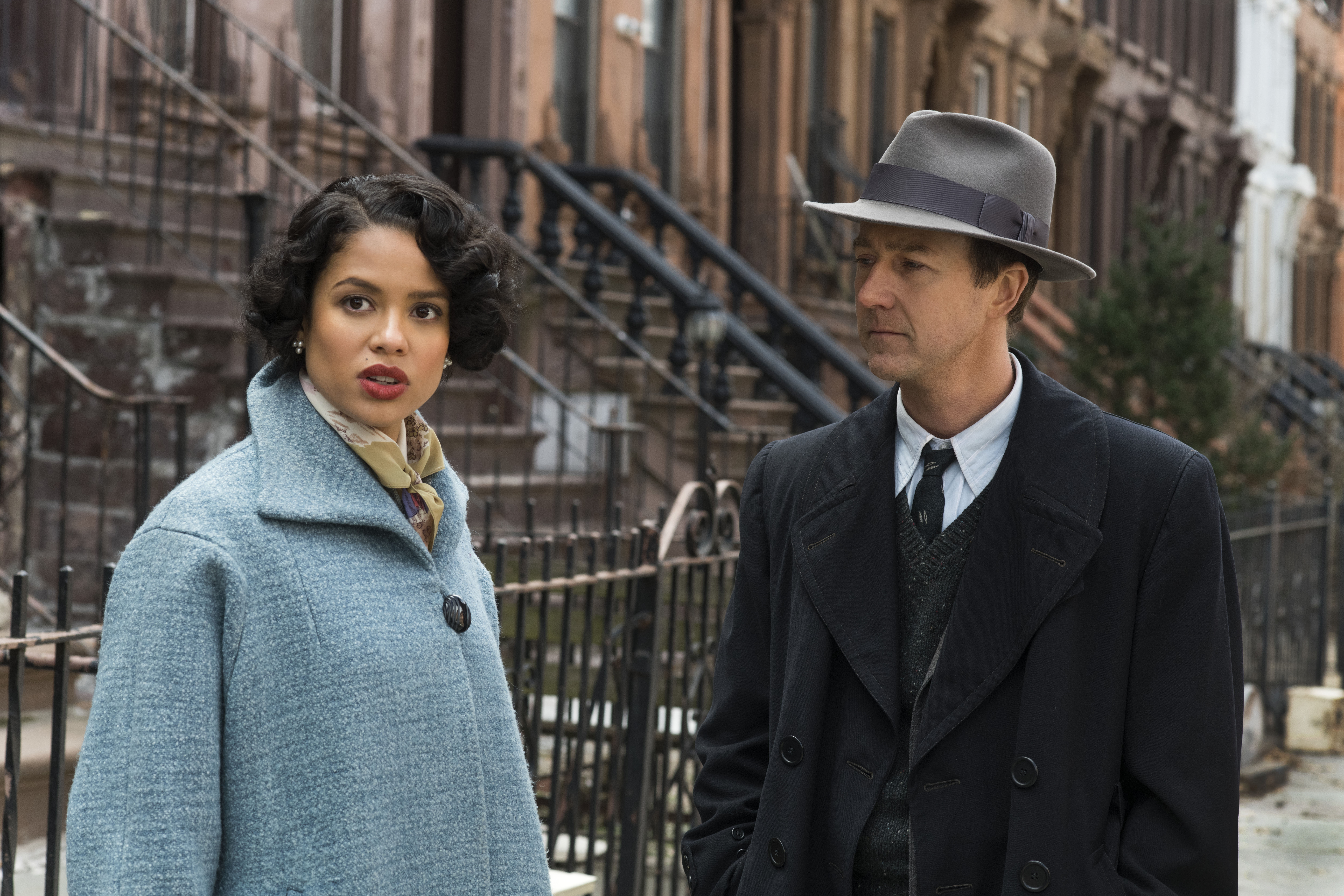
(Nov. 2, 2019 – Source: Getty Images North America)
*Michael Eric Dyson describes Edward Norton’s latest crime drama “Motherless Brooklyn,” as “a rousing piece of entertainment that takes us back in time to take us forward.”
The Warner Bros. picture is based on a novel by Jonathan Lethem that was first published in 1999. The story is set in 1990s Brooklyn but Norton flipped the script by placing the characters against the backdrop of the 1950s. The story follows Lionel Essrog (played by Norton), a lonely private detective afflicted with Tourette’s Syndrome, who is determined to solve the murder of his mentor and only friend, Frank Minna.
“It is a film that measures our failure to see how what happens in the black world reflects the tensions and possibilities in the white world,” Dyson noted in his esquire.com review of the film, but when we caught up with both the filmmaker and controversial academic, they broke down how this noir film also confronts what’s going on in the shadows of American society.
“This film is extraordinary precisely because it takes as its canvas a slice of American history and it sketches on that canvas a powerful reckoning with historic forces that are usually best explored in dry dissertation but rarely gives us a complicated complex treatment that we see on the film here,” Dyson tells EURweb.com.
Peep our full conversation with Edward Norton and Michael Eric Dyson below.
OTHER NEWS YOU MIGHT HAVE MISSED: Diddy Still Heartbroken Over Death of Kim Porter Remembers Her One Year Later with Simple Tribute
Watch intrigue and drama unfold in the trailer for #MotherlessBrooklyn, starring Writer/Director @EdwardNorton, Bruce Willis, @GuguMbathaRaw, with @AlecBaldwin and Willem Dafoe. Only in theaters November 1. pic.twitter.com/uZHpFRvzQY
— Motherless Brooklyn (@MotherlessBKLYN) August 22, 2019
Considering how the racial issues depicted in the film speak to modern society, as you were in pre-production on this project, did you find yourself giving extra attention any of the viral stories about how racism and injustice impacts Black Americans?
NORTON: To some degree, yeah. The #metoo stories were also very stunning in what they revealed about the psychology of power. I think the psychology of power is always such an important one because if we don’t understand what it is that drives the darkest impulses of people to maximize for themselves on every level, it starts to unmask them. In all honesty, I have always thought that noir films, beyond race or racism, have in them, at their best, the determination to unmask the narrative of what’s going on in the shadows, and in a way to insist that there’s an American narrative of ideals of government that we all buy into that we can take a certain amount of pride in, but underneath, in a noir sense, there is a counter-narrative in that shadows that’s going on underneath. It’s not just dark. It’s actually antagonistic to the other narrative, and noir films say ‘we’re going to take this and wander into that shadow and reveal that there are things going on that we should be concerned about.’ The types of people who are doing these things in the shadows are consistent in the sense that they really don’t care about the rest of us. Noir films explore this confrontation with what goes on in the shadows.
I think having lived in New York for 30 years, having worked in affordable housing and community development when I was first out of college, one of the things that bothers me, and Mike and I talked about this at one point, is the modern debate over discrimination. Let’s take the Black Lives Matter moment, if you want to call it that. I don’t think it’s a moment. I think it’s a new banner for the same cause, which is an acknowledgement of the marginalization and dehumanization of people of color. It’s disturbing when you see people attempting to dismiss that with the line that enough time has passed for this to have lost its validity. It’s almost like, enough time has passed and there are no more excuses now. You’re leaning on discrimination like a perpetual crutch and it’s just an excuse for a corrective failure of character by some people to get out of their situation of poverty (and) marginalization.
The problem with that is what’s embedded in it is it deemphasizes the degree to which discrimination has been made infrastructural. It isn’t some vague attitude about people by one other people. A lot of people want to dismiss the history of the way discrimination was baked into urban infrastructure, and in doing that, it gives them the rationale to say, ‘get over it.’ The most perverse thing is, ‘these things are your failures,’ not the ongoing effect of things that were done with intention, and I find that really toxic. That’s the equivalent to Holocaust denial.
When you route for the underdog in a film, it grows the level of abhorrence that you feel towards bullies. I think we’re in this moment where it’s kind of staggering to find that 30% of this country is very willing to very quickly fall back in love with a bully. It’s almost like you’ve got to do things that reveal the bully.
What’s funny is that I think Alec Baldwin has such a great job in miming the really dark psychology of the way power really turns people into brutal bullies. What’s amazing to me is he’s also doing something great in the satirical lane too, ‘cause by mocking Trump by playing Trump he’s also doing the thing that bullies hate the most, which is being made fun of. I love that he’s coming at it from all angles.
Stunning performances. Star-studded cast. #MotherlessBrooklyn is not to be missed. See it today – NOW PLAYING only in theaters: https://t.co/q2CcoFI1Dh pic.twitter.com/cLLl3ItWHX
— Motherless Brooklyn (@MotherlessBKLYN) November 10, 2019
Michael, you had nothing but praise for this film in your review on esquire.com, noting the many ways it speaks to the culture.
Not because it’s trying to hit us over the head with it’s potion of wokeness but it brings us face to face with an issue of race in America and how color determines where people live and how they are moved, and it does that in the context of a broader American narrative about difference, and otherness and strangeness and how do you find perfection and friendship in the midst of the quest to be human, to live your life and pursue your professional aspirations… and you see all those forces arranged in this film.
The Moses Randolph character is literally raising neighborhoods in the pursuit of his ideal architectural construction narrative trying to remake the cities after his own vision, a powerful one, but also one that had negative consequences on many cities, including Black folks in Brooklyn.
For Norton to take a Johnathan Lathan novel, which is set in the 90’s, but then to change that to the 50’s and grapple with the power of jazz and use that as a powerful metaphor for engaging democratic energy and then to talk about urban renewal and the way in which urban renewal really was a mandate of people who were determined to keep their communities whiter and whiter and impervious to the festering influence of Black people, or brown people and certain kind of immigrants from Central and North America — the racial part in the film that deals with Black bodies and when they are erased — when I look at that film, through those eyes and through that lens, I just see an American artist grappling with American ideas that have consequences for race in this country, told in a compelling fashion that understands that it’s gotta be a great picture first and then it can draw us in and engage us and allow us to see some of these deeper issues. So that’s what struck me.
Dyson describes Norton as a “guy who is an actor’s actor, a thespian of the first order — one of the greatest of his generation. Now also delving into directing and making a film that grabs us by the collar.”
“As a consumer of his art, it is ennobling to me that an American artist can take these issues of difference, of marginalization, of dismissals, of bullying those who are different and reserving judgement of those that we don’t appear to be like. So when I look at this film and see that color is a big issue, racism is a big issue, without necessarily announcing it but by pursuing it as an integral part of the fabric of the film, that’s beautiful to me. We always say we want artists to be honest with themselves,” he explains. “For art to be effective, it has to be great. For art to be great, it has to wrestle with the ideas that are central to its own self-definition as a way in which it reflects the world. So talking about film noir as a medium to grapple with post World War II trauma around the issues of difference or the way in which there is blood-curdling opposition from so-called communist countries.”
The film doesn’t wear “its wokeness on its sleeve,” as Dyson states… “it does something even better,” he adds. “It forces us to see that integral to issues of struggle around class, and around culture and around America’s self-definition, are the issues of race, and until we grapple with those, we ain’t going far and we’re not going to deal with what it means to be part of the American dream. And to take that as a given and to use that as a jump-off point to get into so many different issues, was to me very winning.

“A part with being paralyzed with joy when I hear someone like Michael talk about it like that, I think that filmmakers, what we want to do is create emotion,” Norton says, when asked what he hopes audiences are left thinking after watching this film. “To get to anything deeper, you’ve got to make a film that, in the first minute or two, the blend of character and picture and music flips a switch in people’s brains and makes them go, ‘this all feels good and right and I am happy to be here,’ because in the final analysis, we remember films on a more visceral level. You’ve got to infuse hypnosis that makes people enjoy the carpet ride,” he explains.
“My mission is to always get people to buy in and experience the pleasure of being carried back into that time. My hope is that people are talking about what is it in themselves. We get fed a lot of junk food laced with Xanax in our films. We get given a lot to make sure we stay very passive, and I think that the most you can shoot for is that people are talking to each other after a film. They’re asking questions. They’re saying, ‘Did those things really happen in New York?’, or they are seeing through the story, no matter what time it’s set in, and they’re seeing through the story transparently to see how it’s about them,” Norton says.
“C.S, Lewis has the great line, when we read, we read to know we’re not alone, and I think if you can create in an audience a sense of being able to see themselves, see their own history in it, then that is a positive, and if they’re talking about it and debating it, that’s even better. Not being funny at all but if it provokes Michael, or anybody to actually say anything about it, that’s an amazing start for me because it’s saying “Wow, people are discussing it at deeper levels that it discusses overtly itself.”
“Motherless Brooklyn” is now playing in theaters nationwide.
We Publish News 24/7. Don’t Miss A Story. Click HERE to SUBSCRIBE to Our Newsletter Now!





